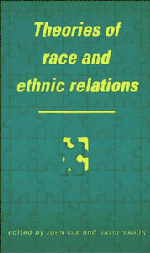Book contents
- Frontmatter
- Contents
- List of contributors
- Preface
- Introduction. Controversies and continuities in race and ethnic relations theory
- 1 Intersecting strands in the theorisation of race and ethnic relations
- 2 Epistemological assumptions in the study of racial differentiation
- 3 The role of class analysis in the study of race relations – a Weberian perspective
- 4 Varieties of Marxist conceptions of ‘race’, class and the state: a critical analysis
- 5 Class concepts, class struggle and racism
- 6 A political analysis of local struggles for racial equality
- 7 Ethnicity and Third World development: political and academic contexts
- 8 Social anthropological models of inter-ethnic relations
- 9 Pluralism, race and ethnicity in selected African countries
- 10 Ethnicity and the boundary process in context
- 11 Ethnicity and the sociobiology debate
- 12 Rational choice theory and the study of race and ethnic relations
- 13 The ‘Chicago School’ of American sociology, symbolic interactionism, and race relations theory
- 14 The operationalisation of identity theory in racial and ethnic relations
- Bibliography
- Index
2 - Epistemological assumptions in the study of racial differentiation
Published online by Cambridge University Press: 01 June 2011
- Frontmatter
- Contents
- List of contributors
- Preface
- Introduction. Controversies and continuities in race and ethnic relations theory
- 1 Intersecting strands in the theorisation of race and ethnic relations
- 2 Epistemological assumptions in the study of racial differentiation
- 3 The role of class analysis in the study of race relations – a Weberian perspective
- 4 Varieties of Marxist conceptions of ‘race’, class and the state: a critical analysis
- 5 Class concepts, class struggle and racism
- 6 A political analysis of local struggles for racial equality
- 7 Ethnicity and Third World development: political and academic contexts
- 8 Social anthropological models of inter-ethnic relations
- 9 Pluralism, race and ethnicity in selected African countries
- 10 Ethnicity and the boundary process in context
- 11 Ethnicity and the sociobiology debate
- 12 Rational choice theory and the study of race and ethnic relations
- 13 The ‘Chicago School’ of American sociology, symbolic interactionism, and race relations theory
- 14 The operationalisation of identity theory in racial and ethnic relations
- Bibliography
- Index
Summary
Looking back on 1948 with the advantages of hindsight, it can be seen that the publication in that year of Oliver C. Cox's Caste, Class and Race was an event of much greater significance than was appreciated at the time. Cox's challenge to what he called ‘the new orthodoxy’ of Robert Park and Ruth Benedict, with whom he associated Lloyd Warner and Gunnar Myrdal, was the opening salvo in an exchange of fire that may have reached its climax in the 1970s. In this paper I seek to clarify the nature of the dispute and to describe some of the ways in which it has developed. If there is a simple illustration of the difference between the two positions it is that Park would probably (like his contemporary Malinowski) have asked students ‘what is your problem?’, whereas the question for Cox and his successors is ‘what is the problem?’.
Cox's dissent
What distinguished Cox's philosophy of social science can best be seen in his statements about how the phenomena of racial relations are to be defined. Early in the section of the book devoted to race he sets out to eliminate certain concepts that he believes to be commonly confused with that of race relations. One of the concepts to be eliminated is that of racism, because studies of its origin substitute ‘the history of a system of rationalization for that of a material social fact’ (1948: 321).
- Type
- Chapter
- Information
- Theories of Race and Ethnic Relations , pp. 42 - 63Publisher: Cambridge University PressPrint publication year: 1986
- 5
- Cited by

